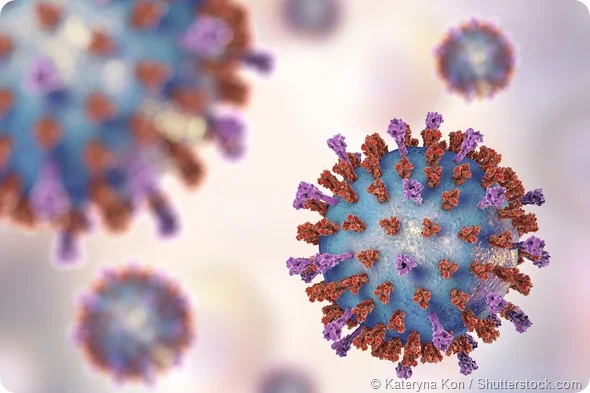For The Latest Medical News, Health News, Research News, COVID-19 News, Pharma News, Glaucoma News, Diabetes News, Herb News, Phytochemical News, Thailand Cannabis News, Cancer News, Doctor News, Thailand Hospital News, Oral Cancer News, Thailand Doctors
Respiratory Syncytial Virus (RSV) causes an infection of the lungs and respiratory tract. It is a very common virus and will infect most children by the time they turn two years old. The RSV infection is highly contagious and can spread quickly through tiny airborne droplets when an infected person sneezes or coughs.

Respiratory syncytial virus. 3D illustration shows structure of virus with two types of surface spikes.
RSV epidemics are most commonly observed from November to January. The infection resembles the common cold and will last between two to eight days. Sometimes symptoms may persist for nearly three weeks.
Preterm babies whose lungs are not adequately developed can have trouble fighting the RSV and get infected more easily that other individuals. Infants and young children who attend day care, or have school aged siblings, have a higher risk of catching the viral infection. Adults are also susceptible to the virus and those caring for infected children are at a higher risk of developing an RSV infection.
RSV symptoms are similar to those of other respiratory illnesses, and usually present within 4 to 6 days of exposure to the virus. The symptoms may include:
Inflammation of the respiratory tract can lead to bronchiolitis, which affects the small airways in the lungs. It can also cause pneumonia in infants less than a year old. In addition, RSV can cause respiratory illnesses such as bronchitis and croup.
Respiratory syncytial virus is seen as a major cause of respiratory infections in adults. Patients who have recovered but have a weakened immune system may continue to be infectious for three to four weeks, even after they begin to recover.
In infants, the infection will typically start out with a runny nose and a drop in appetite. The cough will come within the next three days, followed by sneezing, fever and wheezing. Infants will show increased irritability and may require specialized medical treatment, particularly if they were born prematurely or have reduced immunity.
Since respiratory syncytial virus closely imitates other respiratory illnesses, it can be difficult to identify without a test. A cotton swab or bulb syringe is used to take a sample of the fluid from the nose. It is then tested for viral content in the laboratory.
Most mild cases do not require treatment and will clear up on their own. Antibiotics are ineffective because the infection is viral in nature. The main aim of treatment is to keep the child as comfortable as possible with symptomatic management.
However, if the infection is severe the child may need to be admitted to the hospital. A bronchodilator may be administered to help open the airways, or oxygen may be given via a mask.
As the rapid breathing interferes with the ability to eat and drink, an affected baby may be put on intravenous fluids to ensure it does not get dehydrated and receives enough nutrition. In rare cases, children may also need to be put on a respirator with intubation to help clear the mucus from the system, which will allow them to breathe more easily.
Respiratory syncytial virus is rarely fatal as long as the primary care giver of the baby observes the initial symptoms and reports them to the doctor. Children will take about a week to recover from RSV as long as no additional complications take root due to the weakened immune system. The prognosis is generally very good post treatment.
The following tips can help to prevent the transmission of respiratory sybcytial virus:
References: